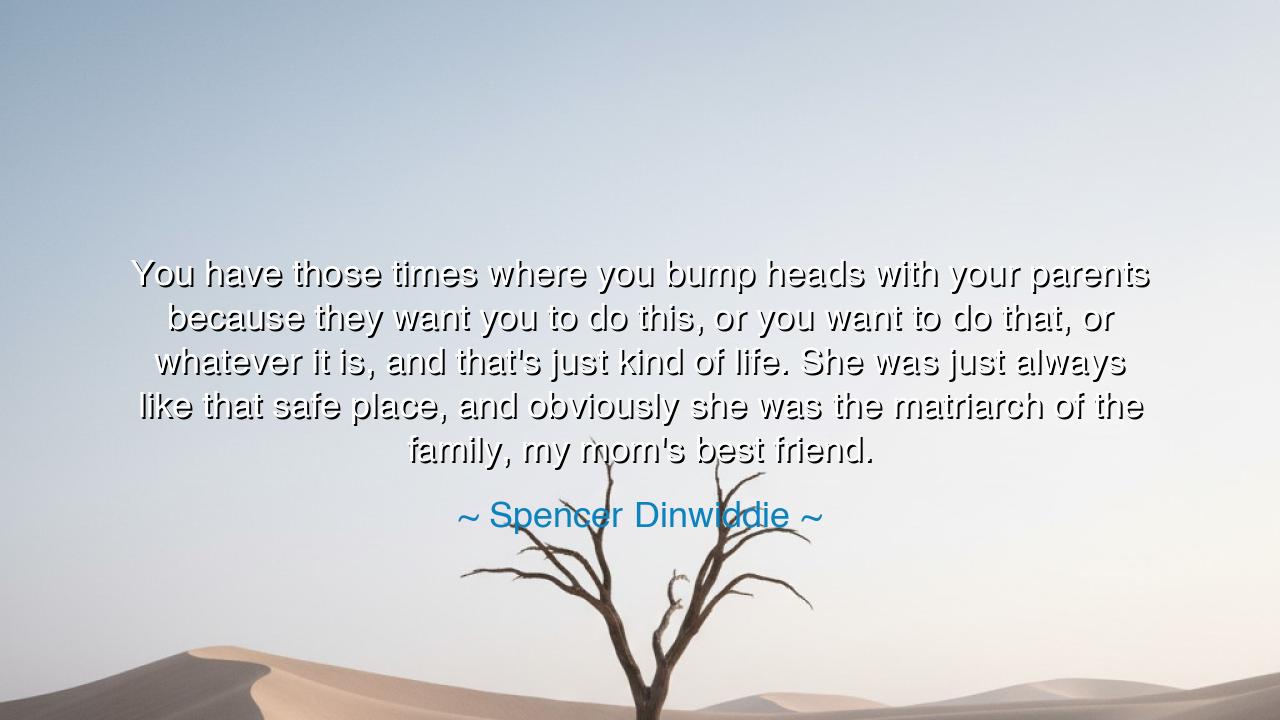
You have those times where you bump heads with your parents
You have those times where you bump heads with your parents because they want you to do this, or you want to do that, or whatever it is, and that's just kind of life. She was just always like that safe place, and obviously she was the matriarch of the family, my mom's best friend.






In the words of Spencer Dinwiddie, we hear the tender music of family life: “You have those times where you bump heads with your parents because they want you to do this, or you want to do that, or whatever it is, and that's just kind of life. She was just always like that safe place, and obviously she was the matriarch of the family, my mom's best friend.” Though spoken in the simplicity of everyday language, this saying carries the weight of eternal truth—the truth that conflict and love are woven together in the fabric of our families, and that behind every quarrel there often stands a figure of safety, a matriarch, a guiding spirit who holds the house together.
The ancients knew this truth well. The family was never free of discord, for generations rise and clash as the tides: the young striving toward freedom, the elders striving to protect, preserve, and guide. But within this cycle there always existed the anchor—the grandmother, the wise woman, the figure whose love was not dependent on agreement, whose embrace was not withheld because of quarrels. In Dinwiddie’s words, that anchor becomes visible: the one who was always a safe place, the soul who stood as a fortress of peace even when the storms of youth and age collided.
Consider the story of Odysseus and Penelope. Though their tale is cast in the mold of epic struggle, it is also the tale of a family tested. Odysseus wanders for decades, his will clashing with the will of gods, his desires often contrary to the duties of his station. Yet it is Penelope—the matriarch, the weaver of patience—who remains the steadfast guardian of their home. When others sought to tear apart the household, she was the safe place, the quiet protector who kept the family whole. In her, as in Dinwiddie’s words, we glimpse the eternal role of the matriarch: a beacon of continuity amid strife.
We might also recall the tale of Franklin D. Roosevelt’s mother, Sara Delano Roosevelt, who in her son’s life was both a shield and a strong voice. Though he often “bumped heads” with her—desiring independence, while she clung fiercely to her role as protector—it was she who nurtured him through polio, who preserved his courage when despair threatened to undo him. She was the matriarch, not always easy, but always the unmovable foundation on which his strength was built.
From these examples and from Dinwiddie’s remembrance, the lesson shines clear: conflict within family is natural, but love must be deeper than discord. The true wealth of a family is not the absence of disagreement but the presence of a haven—someone whose love does not waver, whose presence is a refuge. And when such a person exists, they are to be cherished, honored, and remembered, for they embody the eternal wisdom that family is both struggle and sanctuary.
Let all who hear these words learn this: honor your matriarchs, honor your safe places. Do not take their constancy for granted. Speak your gratitude while they yet live, for their hearts long to hear it. Support them, as they have supported you, and recognize their labor not merely in times of peace but also in the heat of disagreement.
And if you have none such figure in your family, then rise to become one. Become the voice of patience when others quarrel, the refuge when tempers flare, the quiet strength when others falter. Let your presence be the steady flame in the hearth, so that when others recall your name, they may say, as Dinwiddie did: “She was always like that safe place, and the matriarch of the family.”
For in the end, the true victory in life is not found in conquest, nor in wealth, nor even in fame, but in becoming that shelter of love. Be the safe place. Be the matriarch in spirit, whether man or woman, young or old. And in doing so, you will leave behind not only memory but also a living legacy of strength, compassion, and eternal belonging.






AAdministratorAdministrator
Welcome, honored guests. Please leave a comment, we will respond soon